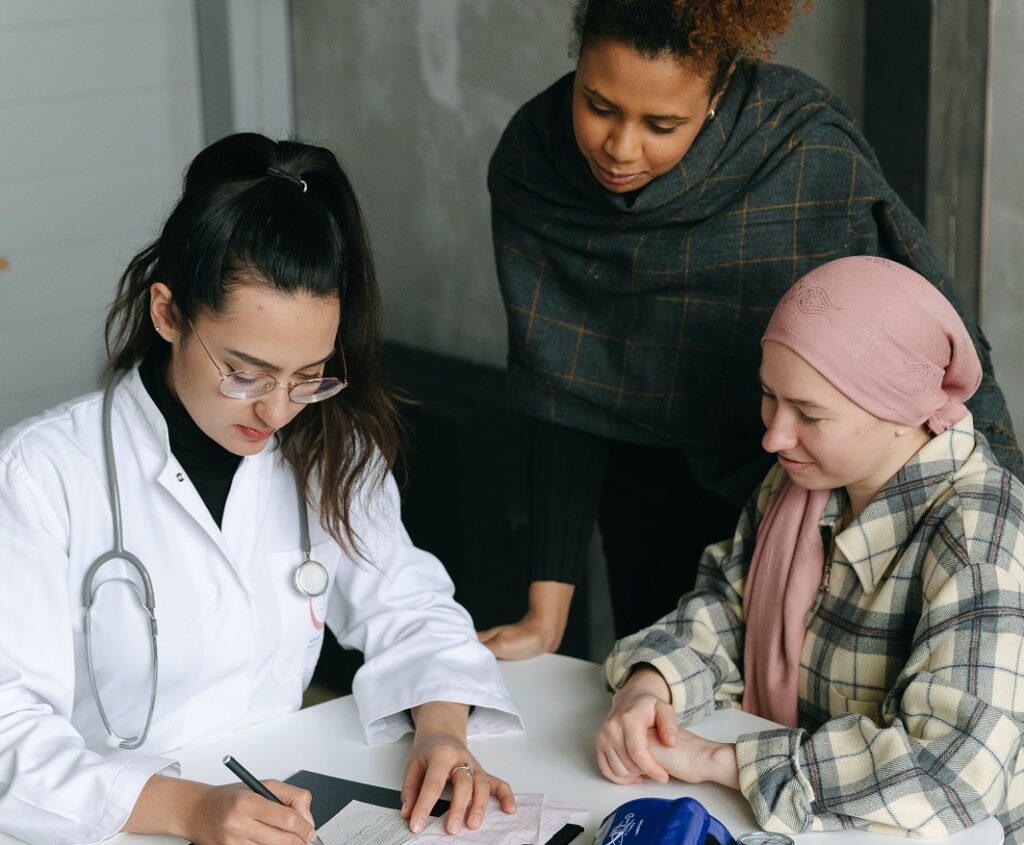Context Health care
Health care in Italy
All citizens not belonging to the EU, legally resident in Italy and registered with the National Health Service, are guaranteed parity of treatment and full equality of rights and duties in terms of access to healthcare.

Overview
In general, access to healthcare is a right ratified by the Italian Constitution (art. 32).All citizens of States not belonging to the European Union (EU), legally resident in Italy and registered with the National Health Service (SNN), are guaranteed parity of treatment and full equality of rights and duties, in line with Italian citizens, in terms of access to healthcare.
However, the offer of and access to health services for TCNs prove to be heterogeneous, with inequalities which burden the most vulnerable subjects, mostly due to the persistent regional differences.
With the migrant population who have started growing from the Seventies, health services began facing new challenges, due for example to the personnel’s lack of preparation to deal with different migrant communities and their related peculiarities, such as the differences deriving from the various Countries of origin, different migratory experiences, the structure of the community by gender and age, the working dimension lived by the migrants, as well as their status. These changes required updated health policies able to protect the health of migrants and refugees present in Italy, and resulted in the approval, in 1998, of the law n.40 called “Turco-Napolitano”, subsequently embedded in the “Testo Unico per l’Immigrazione” (Consolidated Law on Immigration, hereafter TUI), which specifically provides the rules for the assistance to TCNs legally residing (art.34), as well as for the protection of health care for TCNs with lack of regular status (art.35).
These acts finally introduced equity principles in terms of access to health care, and aimed to reduce the main barriers that the TCNs face, related to, for example, residence permits, their time limit as well as the diversified rates for registration to SSN (Italian National Health System). Additionally, the TUI sets as objective the full inclusion of migrants in conditions of irregularity as beneficiaries of health services, guaranteeing them not only urgent care but also essential, continuous care and access to preventive medicine programs, stating also the prohibition for health structures to report to the police authority the presence of irregular migrants who require medical assistance, so as not to hinder their request for treatment, as a way to safeguard both individual and collective health.
Although the law issued in ’98 is valid at national level, its application across the territory has been uneven, as a consequence of the administrative and political decentralization of healthcare provision at regional level, especially regarding the protection of services for irregular migrants. In the regions where the commitment of the SSR is inferior, services provided by voluntary associations or non-profit organizations in terms of migrant’s healthcare fill the gap.
To ensure that all Italian regions are aligned with the national legislation and the principles of protecting the health of foreign citizens, a State-Regions Agreement was signed in December 2012 with the aim of setting standard health care criteria and procedures at operational level. However, this Agreement has now been implemented by only 15 regions through regional resolutions.
As said, TCNs legally resident in Italy are guaranteed parity of treatment and full equality of rights and duties, in line with Italian citizens, in terms of access to healthcare. In order to enjoy this, they need to register to the National Health Service (SNN); the registration is mandatory for some categories (TCNs legally residing in Italy, with regular employment, self-employed or who are enrolled in the placement lists; TCNs legally resident or who have requested the renewal of the residence permit for subordinate work, self-employment, family reasons, subsidiary protection, special cases, special protection, medical treatment, asylum request, awaiting adoption, custody, acquisition of citizenship; unaccompanied foreign minors) and voluntary for others (TCNs residing in Italy who hold a residence permit for study purposes; TCNs working at par).
For what specifically concerns minors, healthcare is always guaranteed, together with the attribution of the pediatrician, regardless of their legal status.
In case of irregular status, as there is no registration to the SNN, during the first assistance TCNs are assigned an individual regional access code with the acronym STP (Foreigner Temporarily Present) recognized throughout the national territory, which is valid for six months, may be subject to renewal and thanks to which the following areas of intervention/treatments are always guaranteed: the protection of pregnancy and motherhood; the protection of the health of the minors; vaccinations according to the regulations and in line with prevention campaigns authorized by the regions; international prophylaxis interventions; prophylaxis, diagnosis and treatment of infectious diseases.
TCNs, especially irregular ones, encounter numerous obstacles in accessing to health care services: the most critical elements concern the lack of awareness of the services available, communication barriers, the different cultural attitudes towards health and healthcare assistance, the poverty conditions experienced by a great part of them, as well as legislative and bureaucratic barriers.
Concerning the communication barriers, most of health services present linguistic, communicative and in general relational obstacles, making the doctor-patient relationship complex and often ineffective, especially in relation to preventive medicine. Moreover, the concepts used by migrants to express their disease status can often differ from the western ones and health personnel who are not culturally prepared to receive and interpret these concepts risk to not fully understand the extent of the person’s problem. This increases the risk of non-trust and the chance that in the future the migrants will not approach the health services to ask for medical help. These obstacles increase when the patient is a woman, due to the possible absence of female doctors to be visited by.
Another hurdle to access health services faced by several TCNs, especially irregular ones, is financial. The Italian SSN has tried to overcome this problem by making registration free and canceling the obligation to pay a fee (known as ticket) for some vulnerable categories; however, it is necessary to consider the sustainability of these costs on the State budgets, as well as the enormous discrepancy in the implementation of this policy at regional level.
Concerning legislative and legal obstacles, worth to be mentioned are the lack of application of national legislation at local health policy level, and the fear that persists in many irregular migrants regarding a possible report to the police authorities in the event of a medical treatment request, mostly due to the lack of knowledge regarding their rights. Furthermore, from bureaucratic and organizational perspective, it is not easy for a migrant to navigate among the administrative procedures necessary for the registration to SSN, or the requests for reimbursement to the prefectures.
Therefore, the design of future policies and interventions aimed at improving the access to health services for TCNs shall take into consideration the obstacles mentioned above and the possible solutions implemented to overcome them, starting with trainings for health staff and by raising TCNs’ awareness regarding their rights.
Covid-19
According to the data reported by the National Institute of Health (Istituto Superiore di Sanità, ISS), as of April 2020, 5.1% of the infected population in Italy was represented by TCNs. Despite this little percentage, the COVID-19 pandemic showed clearly how social inequalities are even more exacerbated in difficult times. In particular, at its outbreak, the pandemic hardly hit those with precarious or inexistent housing, such as guests of the extraordinary reception centers (CAS) or in hotspots, those in informal settlements and homeless, thus resulting in their inability to self-isolate and maintain physical distance, and so comply with the preventive measures required by law. It is presumable that those situations also imply poor hygiene and poor access to clean water, which additionally hinder health conditions.
Together with the possible physical threat caused by the virus, another important and often forgotten aspect is its impact on the mental health and its psychosocial consequences, influencing everyone independently from the presence of infection. For the most vulnerable and “left behind” groups, these reactions are prolonged and severe, increasing the risk of mental health conditions.
Concerning the specific measures that the Government adopted in order to protect migrants, the first one worth to be mentioned is the extension of all residence permits and other key documents, such as, for example, health cards. This allowed TCNs with expiring (or just expired) residence permits to be considered regular on the territory, and so enjoy the SSN. The same extension was guaranteed also to the permanency in reception centres for the asylum seekers and the international protection holders hosted who were supposed to exit the centre during the lockdown; in addition, in this direction, the municipalities were granted the permission of including in the SIPROIMI Centres, in case of required self-isolation or quarantine, the most fragile and vulnerable groups of the population in housing emergency, including TCNs.
Another adopted decision which is still in force envisages two-week quarantine period for migrants arriving through the Mediterranean route on moored cruise ships.
For what concerns specifically the days after the national outbreak, and following the Ministry of Health guidelines, almost all the Italian regions took steps to inform the migrant population on the measures to prevent and respond to COVID-19 with the circulation of targeted messages.
In parallel to the official response of the Italian government, a range of different organizations, including International Organizations, NGOs, and the civil society, have implemented programs and activities to support and protect migrants in the context of the COVID-19 pandemic.
To conclude, it is now necessary to think about the long run and adapt the interventions to the new measures recommended by the Ministry of Health without stopping the assistance programs, including mental health intervention in the provided activities.
Regional focus
In Tuscany there are 417.382 TCNs, representing 11.2% of the total resident population (data ISTAT, 01.2019). This data, which is a higher percentage compared to the national one, represents an important trend towards the stabilization of migrants in the regional territory, in particular in Florence. Tuscan migrant population, moreover, is characterized by a large presence of women and minors, being a potential indicator of the trend towards a long-term permanency of the considered group. According to a study carried out by the National Council for Economics and Labour (Consiglio nazionale dell’Economia e del Lavoro, CNEL), which aimed to detect and compare the integration potential of the various Italian territories, at regional and provincial level, considering the index of integration potential (which is composed by the indexes of attractiveness, social inclusion and employment), Tuscany resulted in the medium-high range, thanks to the strong dynamism of the labour market. All these factors were the basis that led the Region to develop strong inclusion policies in terms of access to services for migrants and refugees.
Regarding the access to health services, the Region follows the national legislation analyzed above, declining it in the services present in the territory. The TCNs present in the region are mostly young, representing a significant health patrimony for the local welfare system.
Concerning the health of TCNs, in general, the Region is in line with the national trend to recur to emergency services instead of following a prevention path at the first stage of illness.
A necessary final consideration concerns the increasing number of foreigners registered to the National Health Service who reside in the Region, which requires an urgent remodeling of the services in light of the diversified health needs of citizens from different backgrounds. A positive sign in this direction is the introduction of cultural mediation by various territories.
Do you want to share your project with our community and stakeholders?
Context Health care
Health care in Slovenia
Overview Health care in Slovenia is organised primarily through the Health Insurance Institute […]
Overview Health care in Slovenia is organised primarily through the Health Insurance Institute […]
Context Health care
Health care in Romania
Overview The legal act governing the Romanian health system is the Law […]
Overview The legal act governing the Romanian health system is the Law […]

